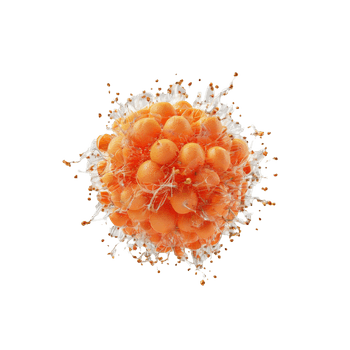Quick version
A, B, C, D, E… There are many different vitamins you can be deficient in, and each of these deficiencies can cause symptoms that impact daily life. By identifying a deficiency, such as in vitamin D or B, you can make small adjustments to your diet and lifestyle that can positively affect your health and well-being.
What Causes Vitamin Deficiency?
Vitamin deficiency can be caused by several factors:
- Insufficient dietary intake: Not consuming enough fruits, vegetables, meat, or dairy products.
- Reduced absorption: Diseases that affect nutrient absorption in the gut (e.g., celiac disease, Crohn's disease).
- Increased demand: Conditions like pregnancy, breastfeeding, growth, or illness.
- Medications: Certain drugs can affect vitamin absorption or metabolism.
The best way to prevent vitamin deficiency is to eat a balanced diet that includes a variety of foods from all food groups.
Common Vitamin Deficiencies and Symptoms
Symptoms of vitamin deficiency can include fatigue, dizziness, loss of appetite, weakness, skin rashes, and muscle cramps. Common vitamin deficiencies in the Nordic countries include:
- Vitamin D deficiency:
- Osteoporosis and osteomalacia in adults
- Rickets in children
- Muscle weakness
- Increased risk of fractures
- Vitamin B12 deficiency:
- Anemia
- Fatigue and weakness
- Nerve damage
- Memory problems
- Folate deficiency:
- Anemia
- Fatigue and weakness
- Inflammation of the tongue
- Neurological problems in the fetus
How to Test for Vitamin Deficiency?
To determine if you have a vitamin deficiency, a common method is to perform a blood test that measures levels of various vitamins. Early identification and treatment of vitamin deficiency are important to prevent serious health problems. A balanced diet and supplements, if needed, can help ensure that the body receives the necessary nutrients.
A, B, C, D, E… There are many different vitamins you can be deficient in, and each of these deficiencies can cause symptoms that impact daily life. By identifying a deficiency, such as in vitamin A, B or D, you can make small adjustments to your diet and lifestyle to improve your health.
What Causes Vitamin Deficiency?
Vitamin deficiency can be caused by several factors:
- Insufficient dietary intake: Not consuming enough fruits, vegetables, meat, or dairy products.
- Reduced absorption: Diseases that affect nutrient absorption in the gut (e.g., celiac disease, Crohn's disease).
- Increased demand: Conditions like pregnancy, breastfeeding, growth, or illness.
- Medications: Certain drugs can affect vitamin absorption.
The best way to prevent vitamin deficiency is to eat a balanced diet that includes a variety of foods from all food groups.
Common Vitamin Deficiencies and Symptoms
Symptoms of vitamin deficiency can include fatigue, dizziness, loss of appetite, weakness, skin rashes, and muscle cramps. Common vitamin deficiencies in the Nordic countries include:
- Vitamin D deficiency: Due to limited exposure to sunlight during the winter months, vitamin D deficiency is common. Specific symptoms of vitamin D deficiency can be:
- Osteoporosis and osteomalacia in adults
- Rickets in children (softening of the bones)
- Muscle weakness
- Increased risk of fractures
- Vitamin B12 deficiency: Especially among the elderly and people following a vegan or vegetarian diet. Specific symptoms of B12 deficiency can be:
- Anemia
- Fatigue and weakness
- Nerve damage (numbness, tingling in hands and feet)
- Memory problems and cognitive disorders
- Folate deficiency: Folic acid deficiency can occur in pregnant women if they do not get enough through diet or supplements. Specific symptoms of folate deficiency can be:
- Megaloblastic anemia
- Fatigue and weakness
- Inflammation of the tongue (glossitis)
- Neurological problems in the fetus (neural tube defects)
In addition to these vitamin deficiencies, the body can also lack important minerals such as zinc, magnesium, potassium, calcium and iron.
Read more about Vitamin B12 deficiency here: Vitamin B12 deficiency? Why does your body need vitamin B12.
Read more about vitamin D deficiency here: Symptoms of vitamin D deficiency.
A, B, C, E and K vitamin deficiencies and symptoms
Here are eight other vitamins you may be deficient in and specific symptoms they can cause:
Symptoms of Vitamin A deficiency- Night blindness
- Dry eyes and corneal damage
- Increased risk of infection
- Skin problems
- Fatigue and weakness
- Decreased appetite
- Nerve damage that can lead to "beriberi" (muscle atrophy, swelling, cramps)
- Cognitive problems and memory loss
- Cracked lips
- Sore throat
- Skin rash and eczema
- Red, swollen tongue
- Pellagra (dermatitis, diarrhea, dementia)
- Digestive problems
- Mental confusion and hallucinations
Here you can read more about: various B vitamins and symptoms of B vitamin deficiency.
Symptoms of Vitamin B6 (pyridoxine) deficiency- Irritability and depression
- Muscle cramps
- Skin inflammation
- Spasms in infants
- Scurvy (bleeding gums, tooth loss, anemia, weakness)
- Impaired wound healing
- Dry and flaky skin
- Joint pain
- Neurological problems (balance problems, coordination)
- Muscle weakness
- Vision problems
- Impaired immune function
- Increased tendency to bleed (bruises, nosebleeds, blood in urine and faeces)
- Impaired wound healing
- Bone health problems
How to Test for Vitamin Deficiency?
To determine if you have a vitamin deficiency, a common method is to perform a blood test that measures levels of various vitamins. Early identification and treatment of vitamin deficiency are important to prevent serious health problems. A balanced diet and supplements, if needed, can help ensure that the body receives the necessary nutrients.
Identifying and treating vitamin deficiency early is important to avoid serious health problems. A balanced diet and, if necessary, supplements can help ensure that the body gets the nutrients it needs. If you suspect you are suffering from a vitamin deficiency, you can test your levels of both vitamins and minerals or individual blood tests for Vitamin A
























